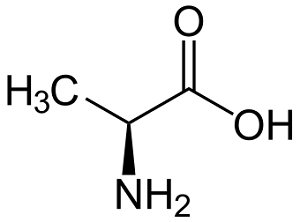L-Alanine

Product Description
L-Alanine is a non-essential amino acid with a broad spectrum of roles in biochemistry and nutrition, as well as potential therapeutic applications.
Product:
L-Alanine
CAS:
56-41-7
Synonym:
L-α-Aminopropionic acid
Structure:

Typical Characteristics
Appearance
White crystalline powder
Density
1.432 g/cm3
Melting point
300 °C (decomp)
Molecular Weight
89.09
Odor
Odorless
Purity
≥98%
Refractive index
1.4650
Uses, Applications & Markets
Key applications
get a quote



L-Alanine used in many
industry applications
L-Alanine is a non-essential amino acid with a broad spectrum of roles in biochemistry and nutrition, as well as potential therapeutic applications. Below are some of its key uses and benefits:
- Protein Synthesis: As a building block of proteins, L-Alanine is crucial in the synthesis of proteins in the body. It is involved in muscle growth, repair, and metabolism, making it important for athletes and individuals engaged in regular physical activity.
- Energy Production: L-Alanine plays a significant role in glucose production during intense physical activity. It can be converted into glucose in the liver, providing a source of energy when carbohydrates are low, which is particularly beneficial during endurance sports and fasting.
- Immune System Support: L-Alanine is important for immune system function. It supports the production of antibodies and other immune cells, helping the body to fight off infections and diseases.
- Nutritional Supplements: It is often included in nutritional supplements aimed at athletes and bodybuilders to aid in muscle recovery and energy production. L-Alanine supplements are also used by individuals looking to enhance their overall amino acid intake for better health and wellness.
- Metabolic Regulation: L-Alanine is involved in the metabolism of tryptophan and vitamin pyridoxine, helping to regulate blood sugar levels by facilitating the conversion of pyruvate, a key intermediate in metabolic processes.
- Therapeutic Applications: Research suggests that L-Alanine has potential therapeutic applications in treating prostate cancer, as it may inhibit cancer cell proliferation. Further studies are needed to fully understand its efficacy and mechanism of action in cancer treatment.
- Medical Nutrition: In medical nutrition, L-Alanine is used in enteral and parenteral nutrition formulations to meet the amino acid requirements of patients who are unable to consume food orally or require nutritional support due to illness or surgery.
- Flavor Enhancer: In the food industry, L-Alanine is used as a flavor enhancer in a variety of processed foods and beverages. It contributes to the umami taste and improves the overall flavor profile of food products.
- Research Tool: In scientific research, L-Alanine serves as a tool for studying various biological processes, including amino acid metabolism, enzyme activity, and the role of amino acids in disease mechanisms.